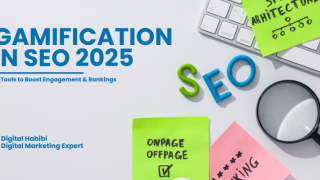Search looks very different now than it did a few years ago. Keywords, backlinks and information are no longer the only things that decide rankings. Instead, engagement signs like how long users stay, how often they come back and how closely they connect are very important to search visibility.
The rules have changed because of Google’s Helpful Content Update, systems that use AI like Search Generative Experience (SGE) and new developments in Answer Engine Optimisation (AEO) and Generative Engine Optimisation (GEO). What you write must not only answer questions, but also keep people interested.
This is where making SEO 2025 more like a game comes in. Brands can make boring material more interesting for users by adding quizzes, badges, polls, challenges and award systems that are dynamic and improve SEO engagement cues.
Gamification is no longer a show for product teams, marketers, and SEO managers; it is a way to grow.
1. Why signs of engagement are more important in 2025
Today’s AI-driven search engines use how people behave as a rating factor.
- Time on Page: Search engines think that information is more important the longer people stay on a page. By making people want to participate, gamification increases stay time.
- Return trips: Search engines like Google now look at repeat trips as a sign of trust and loyalty. Users will want to come back to gamified material like leaderboards, tasks and updates.
- Depth of Engagement: The number of scrolls, clicks on linked elements and polls that are filled out are all tracked to show how useful something is. The gamified modules let users do a lot of little things during each visit.
- Evaluation based on AI: AI SEO tactics look at behavioural data in more detail than older algorithms. It is not just the bounce rate that matters, active interaction loops are just as important.
To sum up, gamification means stronger signs of involvement which means stronger rankings.
2. Formats that are like games and work for SEO
When it comes to SEO, gamification does not mean making your site look like a game. It means adding engaging features that meet the needs of users, and improve SEO signs at the same time.
- Quizzes and self evaluations: Interactive Q&As like “Which online casino bonus fits your style?” make sessions last longer, and give results that can be shared. Quizzes are a great way to get people interested in things like iGaming SEO, online gambling SEO and sports betting SEO.
- Opinion boards and polls: Asking users to vote on things like ‘Best Dubai digital marketing trend in 2025?’ gets them involved, and brings in new UGC. Polls in Arabic help Arabic SEO material show up more in UAE SEO.
- Interactive Guides and tools: Tools like bet tracks and ROI tools let you connect with the content more deeply. For instance, a sports betting SEO tool can help you guess how much you’ll win, which keeps people on your page longer.
- Progress Badges and Rewards: Giving users badges or rewards for finishing articles, classes, or conversations makes them more than just passive viewers.
- Gamified Local SEO Pages: For local SEO Dubai, companies can add tasks (like “Visit all 5 stores to get a deal”) or interactive maps (“Find the closest branch”).
- Leaderboards and tasks: Rankings for things like community service or referral tasks make people more likely to stick with a group. This also has to do with deposit/reward gaming in areas like iGaming.
All of these forms directly improve SEO engagement and work well with tactics that are specific to the industry.
3. Adding your own style to games with AI
In the year 2025, AI is the key to making big scale games possible. AI games let brands make events more personal for a lot of people.
- Adaptive Quizzes: AI changes how a quiz flows or how hard it is based on how people answer. A new player for example, gets tips on how to start betting, while an experienced player gets tips on how to bet better.
- Dynamic Content Challenges: AI SEO strategies figure out what challenges users are interested in and show them those tasks (“Test your Dubai real estate SEO knowledge!” vs. “Boost your iGaming strategy!”).
- Behavior Triggered Reward: If a user stays on high value content for a while, AI will prompt a game-like action (like a badge, mini-challenge or discount).
- Language Personalisation: For SEO in the UAE in 2025, AI can easily switch between English and Arabic SEO material, creating flows that are both fun and educational.
- Ahead of Time Re-engagement: AI finds trends of people leaving your site and offers engaging hooks (like polls or minigames) to get people to come back before they leave again.
This mix of AI and game-like elements keeps experiences fresh, flexible and SEO-friendly.
4. Implementation Playbook: How to Make SEO More Fun with Games
Planning is needed for gamification. For marketing, here is an organised playbook:
Step 1: Find gaps in engagement
Look at your data to see where people leave the site. Pages with high bounce rates, or low stay time are great places to add games.
Step 2: Match the format to the purpose
- Questions that want information lead to quizzes and Frequently Asked Questions (FAQs) with prizes.
- Transactional searches lead to progress bars and tools.
- For local search (SEO Dubai), use review votes and live maps.
Step 3: Combine SEO goals with game play
- To improve Answer Engine Optimisation, make your FAQs more like games.
- To improve the reputation of Generative Engine Optimisation, make comparison tables that people can work with.
- Add game like call to actions to improve results in iGaming SEO, or sports betting SEO.
Step 4: Make it local and bilingual
Make sure that gamified flows are present in both English and Arabic SEO material for local SEO in the UAE. Like Arabic questions about the latest shopping trends in Dubai.
Step 5: Try it out and make changes.
Gamification is a game. Give quizzes A/B tests, keep track of participation data and make changes as needed.
Step 6: Sign in to Awards
To get more people to play, connect gamification to discount codes, reward programs or special material.
This planned approach makes sure that gamification improves both SEO interest, and sales rates.
5. How to Keep Track of the Success of Gamification: Measuring and Reporting
In SEO 2025, it is only as good as the KPIs that it drives. Measurements must be based on SEO cues that have to do with how involved people are.
- Time on Page: Monitor the amount of time users spend on gamified content as opposed to standard content. More time, even 20% more, is better for SEO.
- Return Visits: Keep track of how often people take quizzes, vote or fight in leaderboards. AIs see this as a sign that you are loyal.
- Organic Growth on Gamified Pages: Look at the ranks and traffic growth of control pages, and see how they compare to gamified pages. You can expect overviews that are driven by AI to show more data.
- Micro-Interaction Metrics: Keep track of when people vote in polls, finish quizzes and click on tools. These show that the users are actively taking part.
- AI Citation Frequency (AEO & GEO): Google SGE, Bing Copilot, and ChatGPT reports are more likely to link to in-game FAQs, tools and comparisons.
For Local SEO Dubai, keep an eye on calls, directions, and shop visits that are caused by gamified maps, or tasks.
To show that gaming has clear SEO value, marketers can link it to these KPIs.
6. Use cases in business: where gamification works best
Questionnaires (Which slot game is right for you?) and tasks (deposit leaderboards) get more first-time visitors and people who come back again, and again.
- Sports betting SEO: Fan polls, prediction games and odds tools all boost both interest and natural authority.
- SEO in the UAE: Polls and interactive Ramadan programs that use games to make Arabic SEO material more visible help local SEO in the UAE grow.
- Local SEO Dubai: Loyalty tasks and gamified maps (like Check-in at 3 branches for a reward) lead to offline sales and engagement.
These cases show that gamification can be used in both controlled and unregulated areas.
Conclusion
In 2025, search is about what users do, not what they read. Search engines, like Google and AI-powered personal helpers, like material that keeps people interested, shows authority, and gets people to come back.
In SEO 2025, gamification gives you the tools to do just that. Marketers can do the following by adding tests, polls, tasks, and AI-personalized flows to content:
- More time on page
- More visits again and again
- More growth from plants
- Better exposure based on AI (AEO and GEO mentions)
This is no longer a choice for content and product makers. It’s how SEO will work in the future.
You can get our Gamification Idea Board and look at ready-to-use quiz forms, poll templates, and gamified SEO tests that you can use in your 2025 plan.





